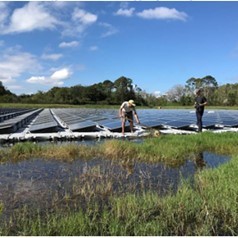The impacts of floating solar panels on lake ecosystems and water quality

Why this project is important: There is an urgent need to decarbonise energy generation and transition to zero carbon to mitigate climate change impacts. As part of the drive to decarbonisation, floating solar panels (photovoltaics, FPVs) show great potential as a sustainable energy source at a global scale. However, we know very little about the impact of these deployments on water chemistry, water quality, biodiversity, and the aquatic environment in general. Positive, as well as negative, effects of FPV deployment are possible, but we must investigate the nature and likelihood of these effects on lake ecosystems to optimise efficiency and overall environmental benefits of this new technology. You can help us fill this important knowledge gap!
The focus: Experimental FPV deployments in the United States are a substantial perturbation of the aquatic ecosystem. By covering the water body surface, FPV deployments reduce the amount of light available for photosynthesis by algae and aquatic plants, as well as wind-driven mixing of the water column. Importantly, microbial organisms, will be sensitive to these ecosystem perturbations, but not much is known about the specific responses of phytoplankton and bacteria to FPV deployments. Changes to the community composition triggered by FPV can have beneficial effects, but might also have unintended negative consequences, for example the dominance of nuisance species resulting in taste and odour issues for drinking water abstraction. You will visit field sites in the US to collect and analyse samples from FPV deployments in lakes and reservoirs to reveal hitherto unknown effects on water chemistry and -quality and overall ecosystem functioning.
What’s in it for the candidate: You will join vibrant research groups in LEC and UKCEH covering Water Chemistry, Lake Ecology, Hydrology and Energy and Environmental Sciences. As part of an interdisciplinary team, you will be trained in state-of-the-art laboratory and field observational methods, participate in fieldwork, and learn about the interactions between emerging clean energy technology, water quality and ecosystem health. In addition to developing your analytical skills, you will build your research network in the UK and with our collaborators in the US.
Eligibility.
Candidates shall be good honours graduates in appropriate subject areas, of a recognised university or comparable university, or persons holding equivalent qualifications who show evidence of exceptional ability, or who have demonstrated their ability in graduate studies.
We are looking for an enthusiastic and determined student who wishes to work with us on this topical and timely project! You don’t have to be an expert, but you should be interested in aquatic research and motivated to learn new skills. We will provide all the necessary training. The project would suit a candidate with a background for example in environmental science, ecology, and geography or be able to demonstrate the required skills. You will be supported by supervisors with experience of working with industry and expertise in Aquatic Chemistry, Ecology, Hydrology and Energy Sciences.
Email address for enquiries.
i.grefe@lancaster.ac.uk
